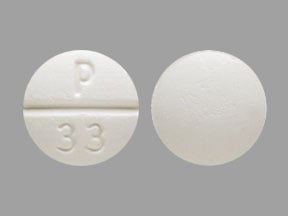
Propylthiouracil Coupons & Savings Card – Discount Prices from $39.80
Propylthiouracil is a medication prescribed to manage hyperthyroidism, which is an overactive thyroid condition. It is particularly considered when patients cannot tolerate methimazole or are preparing for thyroid surgery or radioactive iodine treatment. The drug functions by inhibiting the thyroid gland from producing excessive thyroid hormones, thereby helping to balance hormone levels and alleviate symptoms, providing more energy throughout the day.
While propylthiouracil is a preferred treatment during pregnancy, it should not be used beyond the first trimester due to potential risks to both the mother and the unborn child. It is important to be aware of serious side effects such as liver damage, with symptoms like itchiness and upper right abdominal pain, as well as other possible effects including nausea, rash, joint pain, and loss of taste. This medication is not recommended for children. Always consult with a healthcare provider before starting or stopping this medication to ensure its safety and effectiveness for your specific condition.
Our coupons are free to use. Before paying, show the pharmacist your Propylthiouracil savings card to get your free discount. Use our filters below to edit the prescription box to match your needs. The Propylthiouracil prices will update based on your prescription needs. Above our Propylthiouracil coupons, you can change your location to see pharmacy prices and costs in other areas. We're here to help you buy Propylthiouracil at the lowest price with our prescription discount card.
My prescription
Edit
50MG, Propylthiouracil (180 Tablets)
Select pharmacy

CVS
$39.80
COUPON PRICE
Walgreens
$49.81
COUPON PRICE
Albertsons
$65.54
COUPON PRICE
Walmart
$82.38
COUPON PRICEPropylthiouracil savings card
Show this card to your pharmacist
CVS
$39.80
BIN
ID
PCN
GRP
019876
LH4143A26B
CHIPPO
LHX
Powered by
Propylthiouracil is a medication prescribed to manage hyperthyroidism, which is an overactive thyroid condition. It is particularly considered when patients cannot tolerate methimazole or are preparing for thyroid surgery or radioactive iodine treatment. The drug functions by inhibiting the thyroid gland from producing excessive thyroid hormones, thereby helping to balance hormone levels and alleviate symptoms, providing more energy throughout the day.
While propylthiouracil is a preferred treatment during pregnancy, it should not be used beyond the first trimester due to potential risks to both the mother and the unborn child. It is important to be aware of serious side effects such as liver damage, with symptoms like itchiness and upper right abdominal pain, as well as other possible effects including nausea, rash, joint pain, and loss of taste. This medication is not recommended for children. Always consult with a healthcare provider before starting or stopping this medication to ensure its safety and effectiveness for your specific condition.
Our coupons are free to use. Before paying, show the pharmacist your Propylthiouracil savings card to get your free discount. Use our filters below to edit the prescription box to match your needs. The Propylthiouracil prices will update based on your prescription needs. Above our Propylthiouracil coupons, you can change your location to see pharmacy prices and costs in other areas. We're here to help you buy Propylthiouracil at the lowest price with our prescription discount card.
Related antithyroid drugs prescriptions
coupons from$510.39Save 80%
More prescriptions for hyperthyroidism
coupons from$21.83Save 67%
Related antithyroid drugs prescriptions
Sski Save 80%coupons from $510.39
More prescriptions for hyperthyroidism
Methimazole Save 67%coupons from $21.83
Propylthiouracil dosage forms
Use our Propylthiouracil 50MG coupon with prices from $39.80 for 180 Tablets. You can also use our Propylthiouracil 50MG coupon with prices from $2.84 for 1 Tablet. We have a Propylthiouracil 50MG coupon with prices from $12.81 for 30 Tablets. You can use our Propylthiouracil 50MG coupon with prices from $33.05 for 90 Tablets.
Dosage Quantity Price from Per unit 50MG 180 Tablets $39.80 $0.22 50MG 1 Tablet $2.84 $2.84 50MG 30 Tablets $12.81 $0.43 50MG 90 Tablets $33.05 $0.37 50MG 100 Tablets $33.80 $0.34 50MG 1000 Tablets $101.30 $0.10
| Dosage | Quantity | Price from | Per unit |
|---|---|---|---|
| 50MG | 180 Tablets | $39.80 | $0.22 |
| 50MG | 1 Tablet | $2.84 | $2.84 |
| 50MG | 30 Tablets | $12.81 | $0.43 |
| 50MG | 90 Tablets | $33.05 | $0.37 |
| 50MG | 100 Tablets | $33.80 | $0.34 |
| 50MG | 1000 Tablets | $101.30 | $0.10 |
